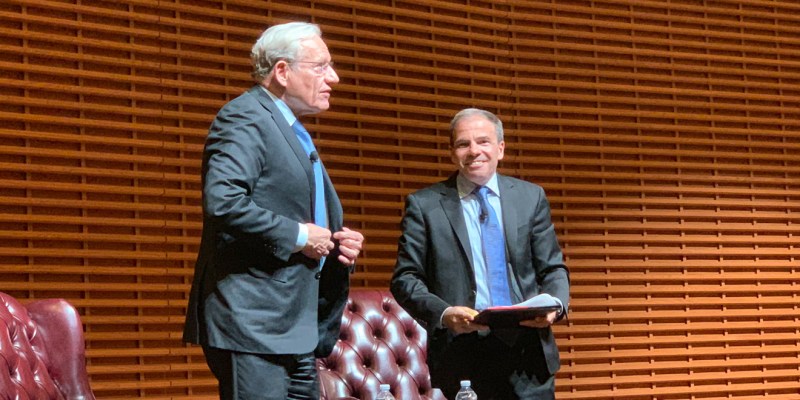Two-time Pulitzer Prize-winning investigative journalist Bob Woodward gave a talk on investigative journalism and the Trump presidency, which he referred to as “a pivot point in history,” Thursday night in Cemex Auditorium.
Former Washington Post editor and current communication lecturer RB Brenner hosted the event, which was part of the communication department’s 53rd annual Carlos Kelly McClatchy Symposium.
Woodward — who is currently an associate editor at The Post — has worked with the publication since the beginning of his career, when his reporting with Carl Bernstein on the Watergate scandal drove him to immense fame and won him and Bernstein a Pulitzer Prize in 1973.
Woodward later received a second Pulitzer for his coverage of the 9/11 terrorist attacks, a story on which he was the lead reporter. Woodward has also published 18 books, most of which have been about the office of the presidency and the most recent of which was his bestselling profile of President Donald Trump, “Fear.”
Woodward spoke at length about Trump, taking care to focus on the president’s policies rather than his demeanor. He said that Trump’s decision-making poses a great economic and foreign policy threat to America, especially with regards to immediate policy issues such as his large corporate tax cuts, tariff war with China and $110 billion arms deal with Saudi Arabia.
“People say [Trump’s presidency is] not normal — I don’t worry about it not being normal,” Woodward said. “No president is normal. He was elected to not be normal; that shouldn’t be the index … [But] the old order is disintegrating; it is being supplanted.”
“There is something immovable about [Trump] on some of these really important foreign policy and economic issues,” he added.
He referred to the president’s approach to such matters as a “gamble” and asked, rhetorically, if a question from Brenner about whether Trump understands the separation of powers was “a question or a joke.”
Along with his criticism of Trump, Woodward expressed disappointment that the media has largely kept pace with Trump’s mercurial tendencies, as opposed to devoting more resources to long-term investigative pieces — the bread and butter of his own journalistic legacy.
“The problem in the media culture is the impatience and speed — Trump leads everyone around, and everyone takes the bait,” Woodward said, noting that the president has an “astonishing ability to seize the news cycle.”
“We cover his tweets as if [they] are major news… We’ve lost our capacity to really dig and understand the details,” he added.
Brenner asked Woodward to comment on the recurring comparison between the current Russia investigation and Watergate, which Woodward defined as Nixon’s “wars on the media, the system of justice and, in the end, on history.”
In response, Woodward reflected on a conversation he had with Sam Ervin (D-NC), who chaired the Senate Watergate Committee from 1973 to 1974. Woodward recalled Ervin telling him that Nixon was motivated by a “lust for political power.”
“I don’t know whether there is criminality … that relates to Trump,” Woodward said. “But if you are looking for a description of what drives him, I think it is a lust for political power.”
“By his own acknowledgement, he is a man who understands lust,” Woodward added, pausing amid laughter from the crowd. “He is a man who understands power. The title of the book, ‘Fear,’ comes from him telling me, ‘Real power is — I don’t like to use the word — real power is fear.’ And the lust for political power is dangerous.”
Woodward was hesitant to make predictions about the outcome of the Russia investigation. When asked about Trump’s recent firing of now-former attorney general Jeff Sessions — which has been compared to Nixon’s infamous “Saturday Night Massacre,” when he fired then-special prosecutor Archibald Cox — Woodward said the development could deeply imperil Trump’s presidency.
“The key word there is ‘could’ — well yes, it could,” he joked. “You know, Martians could land tomorrow. That’s the kind of inflammatory speculation that I do not know what it means. It definitely could be a crisis, the [special counsel Robert] Mueller investigation. [But] I think Trump knows enough to not make Nixon’s miscalculations.”
Anu Pugalia, a Palo Alto resident and longtime fan of Woodward’s, was among the audience members at the talk. He said that Woodward’s cautions against speculation resonated with him given the unpredictable nature of current events.
“Speculation is not a good thing,” said Pugalia. “We’re talking about Attorney General Sessions being fired and what will happen with Mueller — like [Woodward] was saying, nobody knows. He’s more focused on reporting something after it happens and digging up the facts.”
Woodward also provided insight into his own journalistic process of establishing rapport with senior officials, often granting them anonymity and working “from the outside in” to verify the information they provide him.
“I’ve done this for 47 years and I’ve never once gone to a White House briefing, because I knew I was not going to learn anything,” he said, adding that he learned from his Watergate reporting to instead “knock on people’s doors at night” to gain trust and personal insight from those in positions of power.
Such anecdotes left an impact on Pugalia, who expressed admiration for Woodward’s journalistic methodology.
“You just get a sound bite at a press conference, but if you really want to dig deep, you have to do the other things that he talked about, like going to somebody’s house at 11 at night,” Pugalia said. “That’s what makes him a great journalist.”
Contact Katie Keller at ktkeller ‘at’ stanford.edu.
This article has been updated to reflect Archibald Cox’s correct role as special prosecutor. An earlier version of this article incorrectly stated that he served as the attorney general. The Daily regrets this error.
